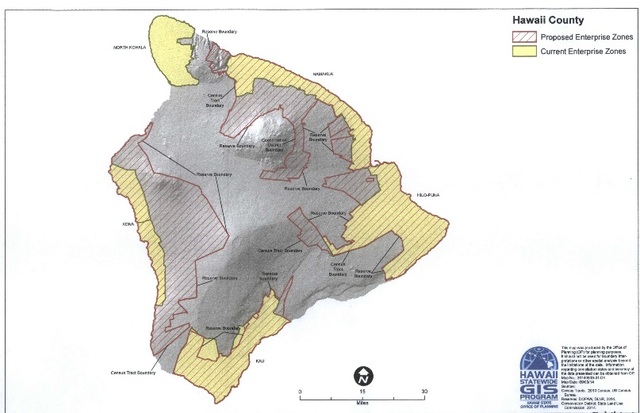A plan to expand county enterprise zones into conservation areas worries County Council members, who Tuesday postponed a vote on continuing the zones, even though several already expired.
“I think we’re all in favor of enterprise zones continuing,” said Puna Councilman Danny Paleka. “I guess the problem becomes where.”
Enterprise zones give substantial tax incentives for businesses willing to locate in economically depressed areas. The 20-year zones are set by the state upon application by the county.
Zones in North Kona, Hamakua and Hilo-Puna expired Oct. 1. The Ka‘u zone is expected to expire May 1, and the South Kona zone continues until April 1, 2016.
The county Department of Research and Development wants to take advantage of the renewals to significantly expand the zones, especially in West Hawaii and around Mauna Kea. A number of ranchers interested in becoming part of the program have had to be turned down because there isn’t an enterprise zone there, said Economic Development Specialist Jane Horike.
But Kohala Councilwoman Margaret Wille and Hamakua Councilwoman Valerie Poindexter asked for more time, saying there could be unintended consequences that could harm specific areas of their districts.
“I have a big problem with this, especially with the expansion into the mauka areas, into the conservation areas,” Wille said. “It’s not opposing economic development. It’s addressing environmental issues.”
Hilo resident Corey Harden urged the council not to expand the districts.
“This resolution would sacrifice thousands of acres of our land to line a few pockets,” Harden said.
Puna resident RJ Hampton also opposed the measure.
“It’s supposed to designate an impoverished area where tax incentives encourage investment and provide jobs for residents,” Hampton said. “Let’s have some economic development for small kine people.”
The program has assisted 200 to 300 manufacturers, wholesalers and agricultural enterprises on the island since its inception, said Wayne Thom, community economic development manager for the state Department of Business, Economic Development and Tourism.
Kona Pacific Farmers Cooperative and Hamakua Mushrooms are two agricultural enterprises benefiting from the program, he said.
Businesses opening in enterprise zones pay no general excise tax for the first three years. In addition, they get an 80 percent state income tax credit the first year, which drops by 10 percent annually until it reaches 20 percent the seventh year. Agricultural enterprises get 20 percent for another three years after that.
All types of qualified businesses also benefit from county property tax breaks on improvements to their property.
Poindexter wanted the county and state to meet with constituents before expanding into new areas. She’s specifically concerned about Waipio Valley, where local taro farmers feel threatened by the intrusion of tourists and others coming to enjoy the breathtaking valley.
“I’m afraid of what’s happening at Waipio. … It’s the second-most visited spot on the island behind the volcano,” Poindexter said. “The roads were built for donkeys. They were not built for vehicles.”
The Committee on Governmental Relations and Economic Development voted 8-1 to delay Resolution 105, with Puna Councilman Greggor Ilagan voting no. Ilagan said the county needs to encourage economic development, especially for agriculture.
“If they’re a business we don’t want to see in those areas, there are zoning laws for that,” Ilagan said.
Email Nancy Cook Lauer at ncook-lauer@westhawaiitoday.com.



